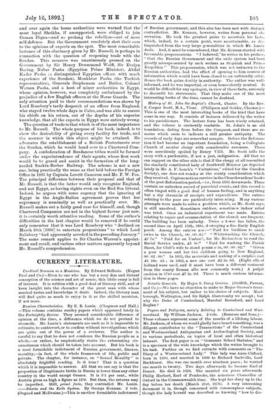Russian Characteristics. By E. B. Lanin. (Chapman and Hall.) —This
volume contains sundry papers which appeared lately in the Fortnightly Review. They aroused considerable difference of opinion at the time, a difference which we do not pretend to reconcile. Mr. Lanin's statements are such as it is impossible to estimate, to controvert, or to confirm without investigations which are quite out of the power of a reviewer. The author is careful to say that he does not condemn the Russian people as a whole,—or rather, he emphatically states the extenuating cir- cumstances which should be taken into account. But his book is a most formidable indictment of Russian government, finance, morality,—in fact, of the whole framework of life, public and private. The chapter, for instance, on " Sexual Morality " is absolutely frightful reading. Is it true ? That is a question which it is impossible to answer. All that we can say is that the proportion of illegitimate births in Russia is lower than any other country in the world except Greece. It is 3.1 per cent., while Austria gives as high a figure as 12.9. But then, the returns may be imperfect. Still, prima facie, they contradict Mr. Lanin. —Siberia and the Exile System. By George Kennan. 2 vols. (Osgood and Mcllvaine.)—This is another formidable indictment
of Russian government, and this also has been met with distinct contradiction. Mr. Kennan, however, writes from personal ob- servation. He took the greatest pains to ascertain his facts, which, indeed, to a certain point, were ascertainable, as dis- tinguished from the very large generalities in which Mr. Lanin deals. And, it must be remembered, that Mr. Kennan started with favourable prepossessions. " I believed," he writes in his preface, " that the Russian Government and the exile system had been greatly misrepresented by such writers as Stepniak and Prince KropOtkin." This prepossession, which was not unknown to the Russian authorities, had the effect of opening to him sources of information which would have been closed to an unfriendly critic. Hence the book gains doubly in authority. The author was well- informed, and he was impartial, or even benevolently neutral. It would be difficult for any apologist, in view of these facts, seriously to discredit his statements. That they make one of the most interesting books of the time, cannot be doubted.


































 Previous page
Previous page